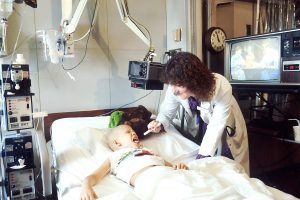Licensed Practical Nurses (LPN) and Registered Nurses (RN) are two types of nurses that differ in several ways. It’s important to be aware of and know the difference between LPNs and RNs before making a choice for what career path to take.
In this article, we’ll look at the key differences between the two, along with their job duties, schooling, and licensure requirements.
Understanding and being aware of the difference between LPNs and RNs, as well as the requirements, is vital to making an informed decision regarding an educational path.
What is a Licensed Practical Nurse (LPN)?
A Licensed Practical Nurse is a medical professional that works directly with patients. They provide the patients with a variety of basic health services.
These include:
- Vital signs
- Assistance with bathing, dressing, and eating
Their responsibilities are crucial in order to ensure that patients’ overall comfort and well-being are maintained while they receive medical care.
LPNs also work closely with RNs and assist them in maintaining patient charts. Additionally, they’re directly involved in communicating between the medical team and patients and their family members.
What is a Registered Nurse (RN)?
A Registered Nurse is a medical professional that works closely with patients and other medical providers to develop the most comprehensive and customized care plans.
Their responsibilities include:
- Performing medication administrations
- Operating medical devices
- Monitoring patients’ condition and symptoms
- Conducting diagnostic tests and evaluating the results
- Educating patients and their family members
RNs oversee LPNs and act as educators and mentors to other nurses. RNs can also be in management and administration roles, as those positions are sought to be maintained by someone with a background and degree in nursing. Also, as a Practical Nurse, you are entitled to job benefits such as higher pay and greater job satisfaction, so it’s not surprising to see more and more PSWs looking to become PNs.
Licensure Requirements – LPN vs. RN
LPN
- Must have a diploma from an accredited and licensed community or vocational college LPN program.
- Pass the National Council Licensure Examination (NCLEX-PN) for certification to practice in the United States.
- Background check.
- Licensing renewal based on continuing education requirements set by the state. The LPN license must be renewed every two to four years (depending on the state).
RN
- Graduated from an accredited nursing school (must be accredited by the ACEN – Accreditation Commission for Education in Nursing and the CCNE – Commission on Collegiate Nursing Education)
- Pass the National Council Licensure Examination (NCLEX-RN) to be licensed as a registered nurse in the United States.
- Background check.
- Licensing renewal based on continuing education requirements set by the state. The RN license must be renewed every two to four years (depending on the state).
What is the NCLEX-PN exam?
- Computer-adaptive test
- 5 hours
- 85-205 questions
- Pass or fail score
Questions in:
- Physiological adaptation
- Coordinated care
- Safety and infection control
- Health promotion and maintenance
- Psychosocial integrity
- Basic care and comfort
- Pharmacological therapies
- Reduction of risk potential
What is the NCLEX-RN exam?
- Computer-adaptive test
- 6 hours
- 75-265 questions
- Pass or fail score
Questions in:
- Physiological adaptation
- Management of care
- Safety and infection control
- Health promotion and maintenance
- Psychosocial integrity
- Basic care and comfort
- Pharmacological and parenteral therapies
- Reduction of risk potential
What is the Main Difference Between LPNs and RNs?
The one major difference between RNs and LPNs is that LPNs require a less formal program than that of an RN.
LPN vs. RN Schooling Requirements
One of the most notable differences between LPNs and RNs is the education requirements. For more education, there will be more time spent in school and thus more cost. Here is a breakdown of the required schooling and length of time for each LPNs and RNs.
LPN Education Requirements
- Practical Nursing Diploma
- As little as 12 months
- Community college or technical college
- Classes include nursing, biology, and pharmacology
- Supervised clinical experiences
RN Education Requirements
- Professional Nursing Degree (Bachelor of Science in Nursing or Associate Degree in Nursing)
- 2-4 years
- Community college or university nursing school program
- Classes include social, behavioral, and physical sciences, along with pharmacology, research, leadership, and ethical/legal issues
- Supervised clinical experiences
LPN vs. RN Duties and Responsibilities
There are major differences between the duties of an LPN and an RN. By law, LPNs are directly supervised by an RN. The LPN and RN role will change and depend on which area they are working in.
In every case, though, the LPN will be under the direct supervision of an RN and each will have their individual scope of practice. RNs can perform all the duties that an LPN can, in addition to other duties.
Below is an overview of just a few duties, but not all-encompassing, as each state has their own scope of practice.
RN Duties and Responsibilities
- Full clinical patient assessment
- Initial and in-depth patient and family education
- All medication administration, including IV medications
- Clinical judgment and autonomy
- In-depth discharge education and instruction
- The process of initiating blood transfusions
- Collecting blood samples
- Inserting, managing, and DCing IVs
- Conducting and performing various diagnostic tests
- Wound care
- Supervising LPNs
LPN Duties and Responsibilities
- Limited and specific patient assessments
- Monitoring RN observations
- Reinforcing patient and family education
- Most medication administration (not including IV meds)
- Ostomy care and cleaning
- Tube feedings, care, and patency
- Performing and charting vital signs
- Checking blood sugar levels
- Assisting with activities of daily living (bathing, getting dressed, eating/drinking, etc)
- Ambulating
- Change wound dressings
- Inserting and maintaining urinary catheters
LPN and RN Career Opportunities
The job outlook for both LPNs and RNs is good. With nurses getting older and retiring, there is a need to fill positions in many areas. While RNs have more of a variety of places to work, as they can specialize, there are a vast number of opportunities for LPNs and RNs.
LPN
- Doctor’s offices
- Nursing homes and skilled nursing facilities
- Schools
- Dialysis centers
- Home health agencies
- Health departments
- Correctional facilities
RN
- Hospitals
- Inpatient and outpatient surgical centers
- Insurance companies
- Colleges and Universities
- Hospice
- Psychiatric hospitals
- Home health care agencies
LPN vs. RN Differences in Career Advancement
When you’re thinking of going to school, or you’re just starting school, it’s sometimes tough to think too much into the future of your career. You imagine getting through school and getting your first job as a nurse, but then what? After working your first nursing job for a few years, you may be looking for other opportunities.
There are many different areas of nursing to choose from. But career advancement is one thing to keep in mind when looking at the differences between LPNs and RNs.
LPN
- Moving to a different area (outpatient clinic, long-term care facility, home health care, physician office, mental health institution, etc).
- Advancing education by completing LPN to RN bridge program to become an RN.
RN
- Move to a different unit in their current hospital (ICU, med surg, speciality unit, cardiac, etc).
- Management, educator, or leadership role.
- Advancing education by completing RN to BSN, Master of Science in Nursing, Nurse Practitioner, or Doctor of Nursing Practice.
What is the Pay Difference Between LPN and RN?
According to the Bureau of Labor Statistics, LPNs earn an average of $20,452 less per year than their RN counterparts.
Is Becoming an LPN Before an RN Worth It?
LPNs are able to get through school much faster, thus spending less money on school. Becoming an LPN can be a way to fast-track your way into the workforce. Working as an LPN can quickly get you hands-on training.
It can help you get experience and see which areas of nursing appeal to you and which areas you don’t care for. No better way to get experience than working in the field.
Another benefit that people find appealing is that many employers will pay for an LPN’s education while they are working. This enables an LPN to work while going to school to advance their career and get their RN degree, all while their employer pays for it. The caveat here is that a contract is usually required.
In return for them paying for your education, you’ll sign a contract saying you’ll work for them as an RN for a certain number of years (usually two or three) after you receive your RN degree.
You may be happy at the place of employment and can see yourself working there anyway. In this case, it’s really a win-win for everyone and something to keep in mind if and when the time comes.
Conclusion
There are many factors to take into consideration when looking at the key differences between LPNs and RNs. While RNs make more money, LPNs can get through school much faster, resulting in lower education costs. It’s not uncommon for someone to get their LPN certification, get a job, and then continue their education as an RN while working in an LPN role.
Getting to work as soon as possible is important for some people. It could also be that they do not have sufficient funds to stay in school long enough to achieve a full degree. Luckily, both the LPN and RN routes are great career choices and can be tailored to a person’s specific needs and wants, depending on where they are currently at in their life.
Sources:
Written by Joanne Potter
Joanne, BSN and RN, is a writer that specializes in health and wellness. She has fifteen years of experience as a Registered Nurse in the NICU (Neonatal Intensive Care Unit). Her years working at the bedside and extensive neonatal knowledge enable her to write with a deep understanding of what patients and families want from their communities. Visit her LinkedIn page.










